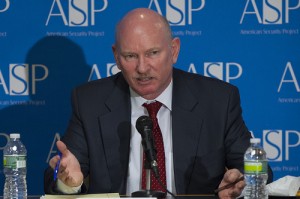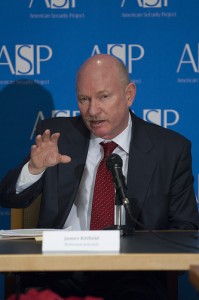On Wednesday afternoon, the American Security Project hosted James KitfieldSenior Correspondent for the National Journal. Mr. Kitfield came to ASP to talk about National Security in an Era of Global Upheval.
You can listen to the event here.
Kitfield said he came out to do a little “strategic free-association,” in which he wanted to look at the “big picture” for national security, talking about the areas he thinks propose the biggest security risks.
He opened by comparing the security situation of the US today, to the situation we were in at the time of the battle of Gettysburg.
The fate of the Civil War, and the nation, Kitfield noted, hung on the decisions of the generals at the time. He thinks that history will judge our period in much the same fashion, with the surges, and more importantly, the wars in Iraq and Afghanistan, as forming the templates for how American security will be defined now and in the future.
“Wars matter,” Kitfield said, “because they chart the rise and descent of nations.”
But it is not just wars that matter. Kitfield pointed to a string of other factors that have contributed to the world we know today:
– The rise of the BRICs countries
– The sweeping away of the Middle East’s old guard regimes
– A revisionist Russia that has not yet fully joined the national order
– An increasingly intransigent Iran and North Korea
– A post Cold War world that saw our defense budget continue to skyrocket
Kitfield pointed out that security threats are not only multiplying, but changing rapidly in their dimensions. “Asymmetric threats and insurgency” are the factors leading to “CIA drone strikes, which I think, are the model of the future.”
He went on to state that he thinks periods of steep draw-down, like we are planning post-Iraq and Afghanistan, are things that our policy makers historically get wrong. 
He suggested that the partisan gridlock policy makers are engaged in now, in the face of “sequestration” and the “fiscal cliff,” is a dangerous security situation.
Kitfield stated that this gridlock, coupled with a “transformative, unsettled” world make threat assessments very difficult.
He outlined three strategies that the US could be engaged in, yet he thinks all possess certain amounts of risk. Kitfield calls his first strategy “grand strategy lite” where the US continues its soft power usage in its pivot away from Europe towards Asia.
He cited cutting of 100,000 ground forces, to a level not seen since before 2001, as a key part of this strategy. Again, he touted the increased use of the CIA’s drone program and Special Forces, where Libya is the template of how to deal with second order security threats.
The second strategy he outlines is “retrenchment and restore.” This basically advocates nation building at home, and helping our allies learn to fight their own battles. He points to security force training in Iraq and Afghanistan as a “Vietnamization” of those conflicts.
The last one he talks about is a strategy of managing decline. Here, Syria is the template in which we have not wanted to enter into another Middle East war. And, with our influence in the region flagging, this strategy announced that we are no longer the “indispensable nation” in the world.
Our overall strategy has to balance risk with resources, something he notes we have lost practice with. He goes on to say that it’s not about doing more with less, “it’s about doing less with less.”
He thinks we will likely see more ground forces cut, and that there is a possibility, depending on Congress, that a reduction in our strategic nuclear arsenal could be in the offing.
Kitfield sees the threats of tomorrow as something that we must manage now, or they could get away from us as they have done in the past.
The challenge has become about having enough strategic foresight to properly identify where our security interests lie and whether or not our political system can handle making those decisions responsibly.
You can listen below:
Check out more of the photos by clicking below:



